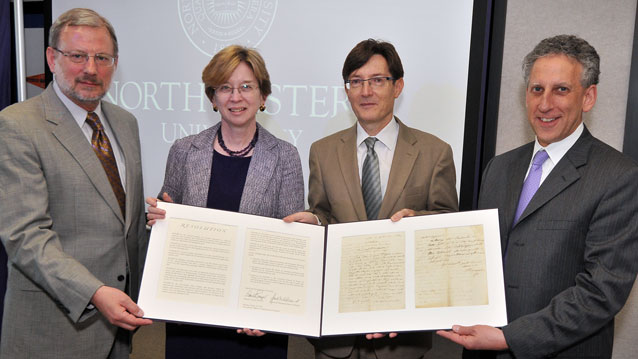EVANSTON, Ill. --- Northwestern University Provost Dan Linzer officially transferred a collection of valuable documents -- including a handwritten letter dated April 27, 1792 and signed by Napoleon Bonaparte’s older brother -- to the Republic of France May 16 in a ceremony at Norris University Center.
The collection of some 250 letters and other historical items dating back to the 15th century was given to the library in the 1980s by the family of Jack McBride. A magician and dancer in a USO troupe stationed in Corsica, McBride is credited with saving the collection from destruction in the final months of World War II when he stopped foreign soldiers from burning documents.
M. Graham Paul, Chicago’s Consul General of France, accepted the McBride Collection, as five members of the McBride family attending the ceremony were recognized for their contributions in preserving the collection. The ceremony followed a symposium on restoring cultural heritage.
Four years ago, archivist Jason Nargis was astonished to discover the 200-plus-year-old letter written in Italian and signed “Buonaparte” while cataloging the McBride Collection at Northwestern University Library.
He quickly determined that it most likely was the archive of a noble Corsican family and represented “a microcosm of noble life.” With its letters, imperial pronouncements, military orders, diplomas, police reports, newspapers and other documents, it is of great potential interest to historians and biographers.
Issues and problems of displaced cultural material and ownership are common, according to Associate University Librarian Jeffrey Garrett, who spoke at the symposium. “Although works of art receive the most public attention, all kinds of cultural property are held, but not necessarily owned, by museums and libraries,” Garrett says.
Figuring out who owns what can be difficult, and the story behind the repatriation of the Bonaparte letter and the collection it is part of is long, convoluted and involves scholars, bureaucrats, handwriting specialists, lawyers and librarians from around the world.
The collection includes correspondence by prominent figures in Corsican and French history. They include Pascal Paoli, an 18th century Corsican patriot and Bonaparte family ally (and later bitter enemy) who wrote the Corsican Constitution; Louis Napoleon, who reigned as Napoleon III in the mid-1800s; and Prosper Merimee, a well-known dramatist whose novella “Carmen” inspired Bizet’s famed opera of the same name.
Outlying documents that appear to have little connection to the rest of the collection are puzzling but also of interest. They include proclamations relating to the appointments of justices to the Oregon Territory, a Nazi newspaper and a handmade swastika made of tissue paper and cardboard.
“The Bonaparte letter casts light on an early episode in the life of Napoleon Bonaparte, and much of the McBride material offers insight into the mores and manners of French and Corsican noble families,” Garrett says. “The paper swastika is a sad final footnote to this archive. We don’t know who made it or why.”
The symposium, “Retour a la France: Restoring Cultural Heritage in the 21st Century,” included remarks by University Library staff members Garrett, Nargis and Sara Stigberg as well as Dean of Libraries Sarah Pritchard, the Consul General and Northwestern historian Peter Hayes, Theodore Zev Weiss Holocaust Educational Foundation Professor in the Weinberg College of Arts and Sciences.
Questions about the legitimate ownership of cultural property, particularly when acquired during war, have gotten greater attention in recent decades but their answers are anything but straightforward, according to Garrett.
Iraqi cultural assets left unprotected during the 2003 American invasion, for example, have been dispersed all over the world. Should they be returned to their country of origin in light of the instability there?
“Questions like that must be asked and the answers debated,” Garrett says. “Yesterday’s symposium and ceremony focused the attention of our community on some of these issues.”


